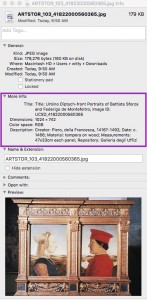An update to the Artstor Digital Library was released earlier this week, so you may have noticed a few differences in the way its interface now looks and acts.
Perhaps most significantly, you’ll see that downloading an image from Artstor now gives you just one file, not two. In the past, downloads produced two similarly named files on your computer: an image file (ending with the extension “.jpg”) and an associated metadata file (ending with “.html”). And ever since Artstor dropped Java three years ago, these two files have come to you as a single zip file, which required you to go through the additional (and annoying) step of “unzipping” the file first.
Artstor’s solution to the problem of having to juggle two different files for each download–plus dealing with those wildly unpopular zip files–has been to give you a single image file that also contains the metadata. This is called embedded metadata, because the information telling you about the artwork is coded directly into the JPEG file. This is especially useful if you download a lot of images from Artstor, because the embedded metadata will be searchable on your computer. So if you had downloaded the image illustrated here, you could search your hard drive for “Sforza” or “Piero” or “Uffizi” or any of the other words listed in the More Info box, and this image would appear in your results.
If you’re new to embedded metadata, all you really need to know is how to view it. It’s not terribly easy to access on a PC unless you have an imaging program like Photoshop installed on your computer. On a Mac, highlight the image file and then either choose Get Info from the File menu or type Command-I (⌘I), and a window like the one illustrated here will open.
But if you like having a separate text file containing the metadata, you can still get one in Artstor. Just click on Download Information in an image’s metadata panel. You can find more information on how to do this and much more on Artstor’s Embedded Metadata support page. (If you’re a PC user and you don’t already have Photoshop, you can even find a link there to a site where you can download a free–and legal!–copy of Photoshop CS2.)
And as always, if you need any help with embedded metadata, just contact me or another member of the VRC staff any time!



 A new version of
A new version of 




